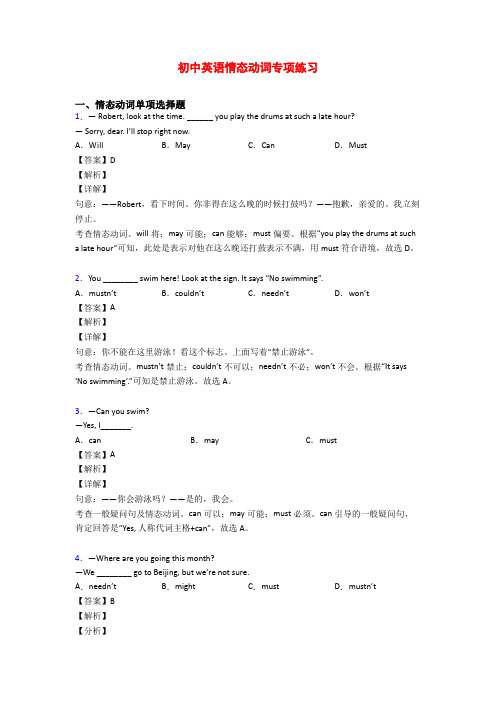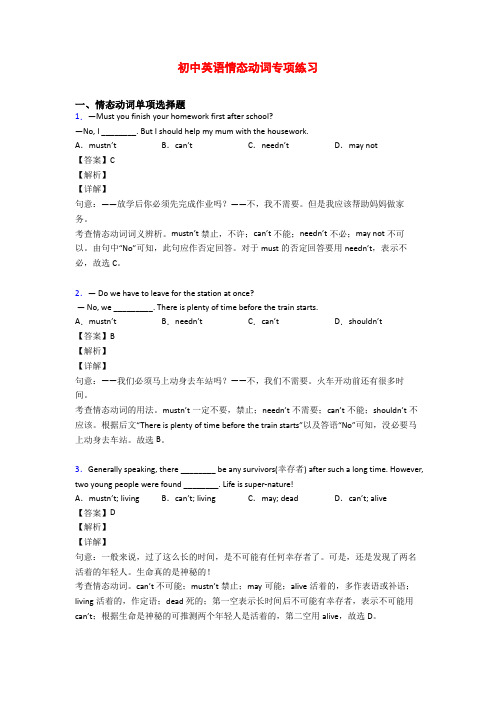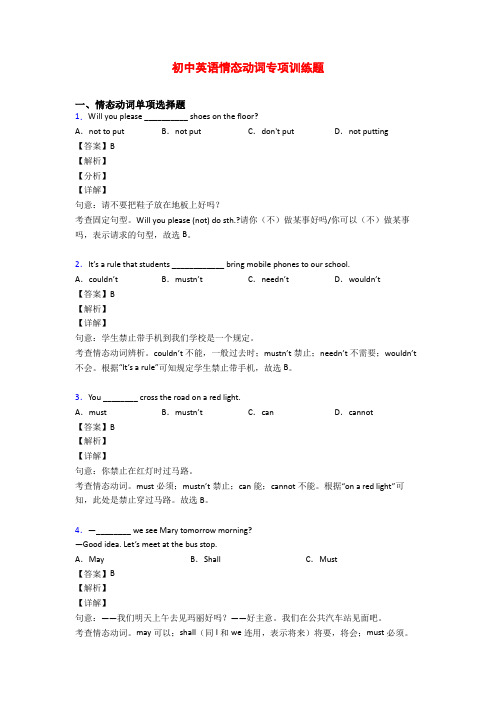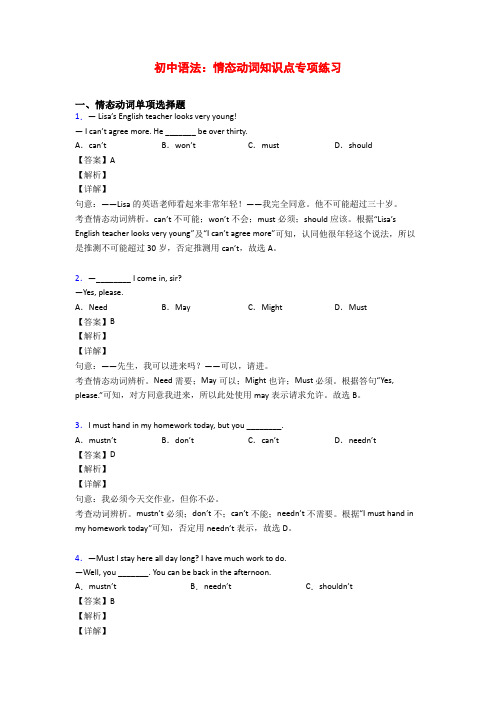初中英语情态动词专项练习题
初中英语情态动词专项练习

初中英语情态动词专项练习一、情态动词单项选择题1.— Robert, look at the time. ______ you play the drums at such a late hour?—Sorry, dear. I’ll stop right now.A.Will B.May C.Can D.Must【答案】D【解析】【详解】句意:——Robert,看下时间。
你非得在这么晚的时候打鼓吗?——抱歉,亲爱的。
我立刻停止。
考查情态动词。
will将;may可能;can能够;must偏要。
根据“you play the drums at such a late hour”可知,此处是表示对他在这么晚还打鼓表示不满,用must符合语境,故选D。
2.You ________ swim here! Look at the sign. It says “No swimming”.A.mustn’t B.couldn’t C.needn’t D.won’t【答案】A【解析】【详解】句意:你不能在这里游泳!看这个标志。
上面写着“禁止游泳”。
考查情态动词。
mustn’t禁止;co uldn’t不可以;needn’t不必;won’t不会。
根据“It says ‘No swimming’.”可知是禁止游泳。
故选A。
3.—Can you swim?—Yes, I_______.A.can B.may C.must【答案】A【解析】【详解】句意:——你会游泳吗?——是的,我会。
考查一般疑问句及情态动词。
can可以;may可能;must必须。
can引导的一般疑问句,肯定回答是“Yes, 人称代词主格+can”,故选A。
4.—Where are you going this month?—We ________ go to Beijing, but we’re not sure.A.needn’t B.might C.must D.mustn’t【答案】B【解析】【分析】句意:——这个月你们要去哪里?——我们可能去北京,但我们不确定。
复习专题 情态动词练习题

复习专题情态动词练习题一、初中英语情态动词1.—Look! The woman at the school gate ______be her headmaster.—No, it ______ be her. She is holding a meeting in the office now.A. must; can'tB. must; mustn'tC. can; needn'tD. may; mustn't【答案】 A【解析】【分析】句意:——看!学校门口的那个妇女一定是她的校长。
——不,不可能是她。
第一空,must表示“一定”;空二,根据She is holding a meeting in the office now. 她现在正在办公室开会,可知,不可能是校长,用can't,表示不可能。
故选A。
【点评】考查情态动词辨析。
注意不同情态动词的用法,注意理解句意。
2.—I wonder if this smart phone is Mary's.—It _______ belong to her. _______ is totally different from this one.A. mustn't; HerB. can't; HerC. can't; HersD. may; Hers 【答案】C【解析】【分析】句意:――我想知道这个智能机是否是玛丽的。
――不可能属于她,她的和这个完全不同。
情态动词表示推测时,用must表示“一定”,用might, could表示“可能”,用can't表示“不可能”。
从句意看,这手机与她的完全不同,故不可能是她的,前面用can't。
形容词性的物主代词后一定有一个被修饰的名词,名词性的物主代词后没有被其修饰的词,本题后没有被修饰的词,用名词性的物主代词,“她的”:hers。
初中英语情态动词专项练习

初中英语情态动词专项练习一、情态动词单项选择题1.—Must you finish your homework first after school?—No, I ________. But I should help my mum with the housework.A.mustn’t B.can’t C.needn’t D.may not【答案】C【解析】【详解】句意:——放学后你必须先完成作业吗?——不,我不需要。
但是我应该帮助妈妈做家务。
考查情态动词词义辨析。
mustn’t禁止,不许;can’t不能;needn’t不必;may not不可以。
由句中“No”可知,此句应作否定回答。
对于must的否定回答要用needn’t,表示不必,故选C。
2.— Do we have to leave for the station at once?— No, we _________. There is plenty of time before the train starts.A.mustn’t B.needn’t C.can’t D.shouldn’t【答案】B【解析】【详解】句意:——我们必须马上动身去车站吗?——不,我们不需要。
火车开动前还有很多时间。
考查情态动词的用法。
mustn’t一定不要,禁止;needn’t不需要;can’t不能;shouldn’t不应该。
根据后文“There is plenty of time before the train starts”以及答语“No”可知,没必要马上动身去车站。
故选B。
3.Generally speaking, there ________ be any survivors(幸存者) after such a long time. However, two young people were found ________. Life is super-nature!A.mustn’t; living B.can’t; living C.may; dead D.can’t; alive【答案】D【解析】【详解】句意:一般来说,过了这么长的时间,是不可能有任何幸存者了。
初中英语情态动词专项训练题

初中英语情态动词专项训练题一、情态动词单项选择题1.Will you please __________ shoes on the floor?A.not to put B.not put C.don't put D.not putting【答案】B【解析】【分析】【详解】句意:请不要把鞋子放在地板上好吗?考查固定句型。
Will you please (not) do sth.?请你(不)做某事好吗/你可以(不)做某事吗,表示请求的句型,故选B。
2.It’s a rule tha t students ____________ bring mobile phones to our school.A.couldn’t B.mustn’t C.needn’t D.wouldn’t【答案】B【解析】【详解】句意:学生禁止带手机到我们学校是一个规定。
考查情态动词辨析。
couldn’t不能,一般过去时;mustn’t禁止;needn’t不需要;wouldn’t 不会。
根据“It’s a rule”可知规定学生禁止带手机,故选B。
3.You ________ cross the road on a red light.A.must B.mustn’t C.can D.cannot【答案】B【解析】【详解】句意:你禁止在红灯时过马路。
考查情态动词。
must必须;mustn’t禁止;can能;cannot不能。
根据“on a red light”可知,此处是禁止穿过马路。
故选B。
4.—________ we see Mary tomorrow morning?—Good idea. Let’s meet at the bus stop.A.May B.Shall C.Must【答案】B【解析】【详解】句意:——我们明天上午去见玛丽好吗?——好主意。
我们在公共汽车站见面吧。
考查情态动词。
may可以;shall(同I和we连用,表示将来)将要,将会;must必须。
初中语法:情态动词知识点专项练习

初中语法:情态动词知识点专项练习一、情态动词单项选择题1.—Lisa’s English teacher looks very young!—I can’t agree more. He _______ be over thirty.A.can’t B.won’t C.must D.should【答案】A【解析】【详解】句意:——Lisa的英语老师看起来非常年轻!——我完全同意。
他不可能超过三十岁。
考查情态动词辨析。
can’t不可能;won’t不会;must必须;should应该。
根据“Lisa’s English teacher looks very young”及“I can’t agree more”可知,认同他很年轻这个说法,所以是推测不可能超过30岁,否定推测用can’t,故选A。
2.—________ I come in, sir?—Yes, please.A.Need B.May C.Might D.Must【答案】B【解析】【详解】句意:——先生,我可以进来吗?——可以,请进。
考查情态动词辨析。
Need需要;May可以;Might也许;Must必须。
根据答句“Yes, please.”可知,对方同意我进来,所以此处使用may表示请求允许。
故选B。
3.I must hand in my homework today, but you ________.A.mustn’t B.don’t C.can’t D.needn’t【答案】D【解析】【详解】句意:我必须今天交作业,但你不必。
考查动词辨析。
mustn’t必须;don’t不;can’t不能;needn’t不需要。
根据“I must hand in my homework today”可知,否定用needn’t表示,故选D。
4.—Must I stay here all day long? I have much work to do.—Well, you _______. You can be back in the afternoon.A.mustn’t B.needn’t C.shouldn’t【答案】B【解析】【详解】句意:——我必须整天待在这儿吗?我有很多工作要做。
初中英语情态动词训练题含答案

初中英语情态动词训练题含答案一、情态动词单项选择题1.My car is broken. ________ you please give me a lift?A.Must B.Need C.Should D.Could【答案】D【解析】【详解】句意:我的车坏了。
你能让我搭个便车吗?考查情态动词。
Must必须;Need需要;Should应该;Could可以。
根据“My car is broken.”可知车坏了,请求搭便车,用Could you please ...?句型表示请求。
故选D。
2.Nowadays Chinese people ________ take too much cash when shopping because they often use Alipay or WeChat Pay.A.shouldn’t B.needn’t C.can’t【答案】B【解析】【详解】句意:现在中国人购物时不需要带很多现金,因为他们经常用支付宝或微信支付。
考查情态动词。
shouldn’t不应该;needn’t不需;can’t不能;根据句意可知,此处指的是不必带很多现金了,故选B。
3.You don’t look well. I think you ________ stop to take a break.A.shouldn’t B.should C.wouldn’t D.would【答案】B【解析】【分析】【详解】句意:你看起来不太好。
我想你应该停下来休息一下。
考查情态动词。
shouldn’t不应该;should应该;wouldn’t不会;would将。
根据“You don’t look well.”可知,此处是建议应该停下来休息一下。
故选B。
4.—________ Tom read poems well when he was a child?—I’m afraid not. But he really does it well now.A.Can B.May C.Could D.Will【答案】C【解析】【分析】【详解】句意:——汤姆小时候读诗读得好吗?——恐怕不能。
初中英语专项练习——情态动词(含答案)
初中英语专项练习——情态动词(含答案)一、单项选择1.---Our class wins the English speaking contest.---Congratulations! You ____ be very proud of it.A. canB. needC. wouldD. must2.People ____ cross the road if there is a red light on.A. mustn'tB. needn'tC. can'tD. may not3.You ____ park your car in front of the school gate.A. needn'tB. mustn'tC. mustD. may4.— May I put my bike here?— No, you ____. If you do, you may lose it.A. needn'tB. won'tC. mustn'tD. wouldn't5.— Susan, would you like to go hiking with us this afternoon?— I'd love to, but I ____ study for a test.A. mayB. have toC. canD. could6.—— Must I finish the work by 10 o'clock?—— No, you ____. You can finish it tomorrow.A. mustn'tB. won'tC. don't have toD. can't7.You ____ wear sports shoes when you climb a mountain.A. can'tB. shouldn'tC. mustn'tD. have to8.—— Would you like to go to the cinema with us after school?—— Sorry, I ____ do my homework first.A. mustB. canC. mayD. could9.Cars, buses and bikes ____ stop when the traffic light is red.A. canB. mustC. mayD. need10.It's raining harder and harder. I ____ stay at home and do some reading.A. have toB. mustC. shouldD. need11.It rains heavily, so we ____ stay at home.A. have toB. had toC. mustD. mustn’t12.---Where is your boss, Jack?---Well, I think he ____ in the office.A. can beB. must beC. can have beenD. mustn’t have been13.Hurry up. He ____ for us at the station.A. must waitB. must be waitingC. should waitD. should waiting14.— David, turn off your computer now! You ____ play on it too long.— I see, mum.A. couldn'tB. mustn'tC. wouldn'tD. needn't15.You ____ wash your hands before meals. It is good for your health.A. mayB. canC. have toD. must二、完形填空Nick is a middle school student. He studies hard, 1 he is very naughty (淘气的), too. In summer holidays, he often plays with other friends in the park. The park is near his house. One day he 2some new clothes as his birthday presents. He felt very 3. "Mum, can I go cycling(骑车) with my friends? I want them to 4my new clothes," asked Nick. "Yes, please keep your clothes 5," said mother. She was doing some cooking. "We'll 6 supper after you come back." Two hours later, Nick went home 7 supper. "Why are your clothes so 8 ?" asked his mother."I'm sorry, Mum," 9 Nick. "I had no time to 10 my clothes when I fell off the bike."1. ____A. andB. butC. soD. because2. ____A. boughtB. broughtC. hadD. got3. ____A. happyB. sadC. angryD. well4. ____A. meetB. looksC. seeD. watch5. ____A. cleanB. niceC. blueD. big6. ____A. keepB. getC. haveD. has7. ____A. withB. ofC. toD. for8. ____A. dirtyB. cleanC. newD. old9. ____A. toldB. askedC. saidD. answered10. ____A. take onB. take offC. take inD. take up三、阅读理解Jimmy is at school now. He is in the classroom, but he can't find his schoolbag. Where is it? Is it lost? Oh, no! It is in his room. He doesn't take (带) it to the school. He calls his sister Sally and asks her to take(带)his school things to the school. Here are his school things.His schoolbag is on the chair. Under the chair is his pencil box. His notebook is on the desk. His dictionary is on the bed. His pencils aren't inthe pencil box. They're on the sofa.Oh, Sally, don't forget(忘记) to take his baseball. Jimmy always plays baseball after school. But where is his baseball? Oh, it's under the table.1. ____Where is Jimmy's schoolbag?A. In his room.B. In the lost and found box.C. In the classroom.D. We don't know.2. Sally is Jimmy's ____ .A. motherB. sisterC. cousinD. friend3. Jimmy' s pencil box is ____ .A. on the deskB. in the schoolbagC. on the sofaD. under the chair4. ____What is on the sofa?A. Sally’s pencils.B. Jimmy’s pencils.C. Sally’s notebook.D. Jimmy' s notebook.5. ____What does Jimmy do after school?A. He calls his sister.B. He calls his mother.C. He plays baseball.D. He plays computer games.参考答案1.【答案】D【解析】此题考查情态动词,表示肯定推测,故选D。
初中语法:情态动词知识点专项练习题
初中语法:情态动词知识点专项练习题一、情态动词单项选择题1.You’d better________ the light when your hands are wet.A.put in B.to put up C.not put in D.not put up【答案】C【解析】【分析】【详解】句意:你手湿的时候最好不要安装灯。
考查非谓语动词及动词短语的用法。
put in安装(设备);put up张贴。
根据“You’d better… the light when your hands are wet”可知,手湿的时候不要安装灯,had better not do sth“最好不要做某事”,故选C。
2.—May I have some wine to drink?—No, you ________. You have to drive home later.A.mustn’t B.needn’t C.can’t D.may not【答案】A【解析】【详解】句意:——我可以喝点酒吗?——不,你不能。
你一会儿得开车回家。
考查情态动词。
mustn’t不可以,表禁止;needn’t不需要;can’t不可能;may not可能不是。
上句询问能否喝点酒,结合“drive home”可知,开车不能喝酒,表禁止,故用mustn’t。
故选A。
3.A hard-working man ________ become a great scientist, but a great scientist ________ be a hard-working man.A.can’t; can B.may not; must C.can’t; must D.may not; can【答案】B【解析】【详解】句意:一个努力的人可能不会成为一位伟大的科学家,但一位伟大的科学家一定是一个努力的人。
考查情态动词表推测。
第一个空,can’t表示“不能”或“不可能”,may not表示“可能不”,根据语境可知,努力的人可能成为伟大的科学家,也可能不会成为,因此排除选项A和C;第二个空,must be表示“一定是”,can be表示“有时是、可以是”,根据题干前半句和but 转折可知,此空应用肯定推测,即must be,排除选项D。
初中英语情态动词专项训练题
初中英语情态动词专项训练题一、情态动词单项选择题1.—Excuse me, could I borrow this book? —Of course, but you ______ return it on time. A.can B.must C.may D.could【答案】B【解析】【详解】句意:——打扰一下,我能借这本书吗?——当然可以,但你必须按时归还。
考查情态动词。
can能,会;must必须;may可能;could能;根据句意可知,此处指的是“必须按时归还”,语气非常强烈,应用must表示,故选B。
2.Don’t go out if you have the flu. You ________ stay at home.A.should B.may C.will【答案】A【解析】【详解】句意:如果你得了流感就不要出去。
你应该待在家里。
考查情态动词。
should应该;may可能;will将要。
根据“Don’t go out if you have the flu.”可知,此处表示得了流感应该待在家里,表示建议,用情态动词should。
故选A。
3.My classmate is jumping so far! I ________ believe my eyes.A.shouldn’t B.needn’t C.mustn’t D.can’t【答案】D【解析】【分析】【详解】句意:我的同班同学跳得这么远!我无法相信我的眼睛。
考查情态动词辨析。
shouldn’t不应该;needn’t不需要;mustn’t禁止;can’t不能。
根据“My classmate is jumping so far!”可知,本句是根据客观事实作出的判断,因此can’t符合句意,表示“我无法相信我的眼睛”。
故选D。
4.Sorry, I ________ go shopping with you yesterday afternoon. Because I was too busy. A.could B.couldn’t C.am able to D.couldn’t able to 【答案】B【解析】【分析】【详解】句意:抱歉,我昨天没能和你一起去购物,因为我太忙了。
人教版中考英语专项训练情态动词专题(含答案)
人教版中考英语专项训练情态动词专题(含答案)一、初中英语情态动词1.— I take the magazine out of the reading room?— I'm sorry you .A. Could; couldn'tB. Must; couldn'tC. Will; can'tD. May; can't【答案】 D【解析】【分析】句意:——我可以把杂志带出阅览室吗?——对不起,你不能。
could 能,可以;must必须;will将;may可以;can能,可以,can't不可以,不能。
此处表示请求许可,用could或者may,由could或者may构成的一般疑问句,肯定回答用yes,主语+can,否定回答用sorry,主语+can't,结合选项,故答案选D。
【点评】考查情态动词的辨析。
注意理解句意,理解选项,根据语境,选出正确的答案。
2.—Where is George?—He _______ be here just now. His coffee is still warm.A. needB. can'tC. mustD. shouldn't【答案】 C【解析】【分析】句意:——乔治在哪里?——他刚才一定在这里,他的咖啡还是热的。
A. need需要; B. can't 不能,不可能(表示推测); C. must 必须,一定(表示推测); D. shouldn't不应该;根据His coffee is still warm.可知表示肯定推测一定在这儿;故答案为C。
【点评】考查情态动词。
掌握情态动词表推测时的意义和用法。
3.— Sorry, I forgot to take money with me. Maybe I can't buy the book you like.— Mum, you ______ worry about it. We can pay by Alipay (支付宝).A. can'tB. needn'tC. mustn'tD. shouldn't【答案】 B【解析】【分析】句意:——对不起,我忘记带钱了。
- 1、下载文档前请自行甄别文档内容的完整性,平台不提供额外的编辑、内容补充、找答案等附加服务。
- 2、"仅部分预览"的文档,不可在线预览部分如存在完整性等问题,可反馈申请退款(可完整预览的文档不适用该条件!)。
- 3、如文档侵犯您的权益,请联系客服反馈,我们会尽快为您处理(人工客服工作时间:9:00-18:30)。
初中英语情态动词专项练习题情态动词:can could may might will would must have to need had better should情态动词特点1.情态动词没有人称和数的变化.2.情态动词后必须跟动词原形。
考点一:can,could, may,must 等情态动词的用法:1. can 的用法:(1).表示能力,译为“能、会”,即有种能力,尤其是生来具备的能力。
She can swim fa st, but I can’t . 她能游得很快,但我不能。
I can see with my eyes. 我用眼睛看。
(2).表示许可,常在口语中。
You can use my dictionary. 你可以用我的字典。
(3).表示推测,条件: 常用于否定句和疑问句中,此时can’t 译为“ 不可能”。
Can the news be true? 这个消息会是真的吗?—Can it be our teacher?那个人有可能是我们老师吗?—No, it can’t be our teacher. He is on a visit to the Great Wall.不可能。
咱们老师正在游览长城呢。
【例题】—I think Miss Gao must be in the library. She said she would go there. —No. She __be there, I have just been there. A.can’t B.mustn’t C.needn’t D.wouldn’t【解析】根据下文“我刚去过那儿”可知,应为“ 不可能”,can’t表示推测[答案] A2. could的用法:(1).can的过去式,意为“ 能、会”,表示过去的能力。
He could write poems when he was 10. 他十岁时就会写诗。
(2). could在疑问句中,表示委婉的语气,此时could 没有过去式的意思。
Could you do me a favour? 你能帮我个忙吗?—Could I use your pen? 我能用一下你的钢笔吗?—Yes, you can.可以。
(注意回答,用could提问,必须用can来回答)3. may的用法:(1).表示请求、许可,比can 正式May I borrow your bike? 我可以借你的自行车吗?You may go home now. 现在你可以回家了。
【例题】—_______ I borrow your MP3? —Sure . Here you are.tA. May B.Should C.Must D. Would【解析】在此处表示请求,意为“ 做……可以吗”。
答案:A(2) .表示推测,谈论可能性,意为“ 可能,或许”,条件:表示不太有把握的推测.It may rain tomorrow . 明天可能会下雨。
She may be at home. 她可能在家呢.(3) .may的过去式为might ,表示推测时。
可能性低于may。
He is away from school. He might be sick.他离开学校了,可能是他生病了。
(4) . 表示希望、祈求、祝愿,常可译为“祝愿”。
通常是用may +主+VMay you have a good time. 祝你过得愉快。
May you be happy! 祝你幸福!May you succeed!祝你成功!4. must的用法:(1).must 表示主观看法,意为“必须、一定”。
You must stay here until I come back.在我回来之前你必须呆在这儿。
Must I hand in my homework right now? 我必须现在交作业吗?(2) 其否定形式mustn’t表示“ 一定不要” “千万别” “禁止, 不许”.You mustn’t play with fire.你不许玩火。
You mustn’t be late. 你一定不要迟到。
(3)对must引导的疑问句,肯定回答为must,否定回答为needn’t 或don’t have to . —Must I finish my homework?我现在必须完成作业吗?—No, you needn’t.不,你不必。
(4)must表示推测,翻译成:想必,一定.条件:1.有把握的推测2.用于肯定句。
The light is on, so he must be at home now.灯亮着,他现在一定在家。
5. need的用法:(1).need 表示需要、必须,主要用于否定句和疑问句中,其否定形式为needn’t,意为“没有必要,不必”。
用need 提问时,肯定回答为must,否定回答为needn’t或don’t have to。
—Need I stay here any longer? 我还有必要留在这儿吗?—Yes, you must .是的。
—No. you needn’t /don’t have to. 不,你不必。
(2).need 还可以作实义动词,此时有人称、数和时态的变化,常构成词组need to do sth。
I need to do it right now. 我需要马上做这件事。
He needs to learn more about the girl.他需要多了解那个女孩。
如果是物作主语,一般用need doing与need to be done这种情况下应注意两点:①.主动形式的动名词doing具有被动的含义;②.该动名词可以改为其动词不定式的被动形式而句子的意义不变。
例如:. The door needs painting. = The door needs to be painted. 那扇门需要油漆一下。
Your carneeds mending. = Your car needs to be repaired. 你的车需要维修了。
6. shall 的用法:shall表示征求对方意见(多用于第一人称),Shall we go out for a walk? 我们出去散步好吗?在英语中,我们可以用其他多种方式提出我们的建议或征求对方意见。
(1).用“Let's do...”来提出建议。
如:Let's go for a walk after supper.(2).用“What/How about...?”来提出建议;about后接名词或动词ing形式。
如:What about/How about a drink? What about/How about taking Tom with us?(3).用“Why not...?”来提出建议,表示“何不……”not面后接动词原形。
“Why not...?”实际上是“Why don't you/we...?”的简略形式。
如:Why not meet at the school gate at eight? Why don't we stay here another day?(4).用“Would you like...?”来提出建议,意思是“你想要……吗?”Would you like后可接名词或不定式。
如:Would you like a cup of tea?Would you like to go and see her?因此,如果我们说:“去游泳好吗?”英语中可有这样几种表达法:Shall we go for a swim?Let's go for a swim,shall we?What about/How about going swimming?Why not go for a swim? Would you like to go for a swim?What do you think of going for a swim?8. should的用法:(1).should 意为“应该” ,可表示劝告、建议、义务、责任等。
We should protect the environment. 我们应该保护环境。
9. will 的用法:will表示意愿、意志、打算,可用于多种人称。
I will help you if I’m free this afternoon.今天下午如果我有空,我就会帮你。
注意:1、will在there be句型中的形式及其句式变换。
由于“一般将来时”的结构可以用“will+动词原形”来表示,所以there be句型的一般将来时的形式就是there will be。
(一定不能说there will have)There are many students in our school. →There will be many students in our school. There will be a sports meeting next week. 一定不能说:There will have a sports meeting next week.10. had better 的用法:had better “最好”,没有人称和数的变化,后面接动词原形,其否定形式为:had better not do。
We had better go now. 我们最好现在就走。
You had better not give the book to him.你最好不要把这本书给他。
考点二:含有情态动词的疑问句的回答1.对may 引出的问句,可以有下列回答方式:肯定回答:Yes, you may. Yes, of course.Yes, certainly.Sure .否定回答:No, you mustn’t.No, you can’t.2.对must引出的疑问句,回答方式为:Yes, …must. No,… needn’t/ don’t have to.3.could在疑问句中,表示委婉的语气,此时could 没有过去式的意思。
—Could I use your pen? 我能用一下你的钢笔吗?—Yes, you can.可以。
(注意回答)4. shall引出的疑问句用于第一人称,表示征求对方意见或客气的请求。
其回答方式有以下几种:Yes, please.All right.No, thank you.5.would you…的回答方式有以下几种:Yes, I will. (No, I won’t.)Sure . (I’m sorry , I can’t.)All right/ OK/ With pleasure.Certainly. (No, thank you .)Yes, please.【例题】—Would you do me a favour and pass on my thanks to Lily? —________.A.That’s rightB.With pleasureC.It doesn’t matterD.No trouble【解析】A. “对了” ,B. “ 乐意效劳”, C. “ 没关系” D. “不费事”。
